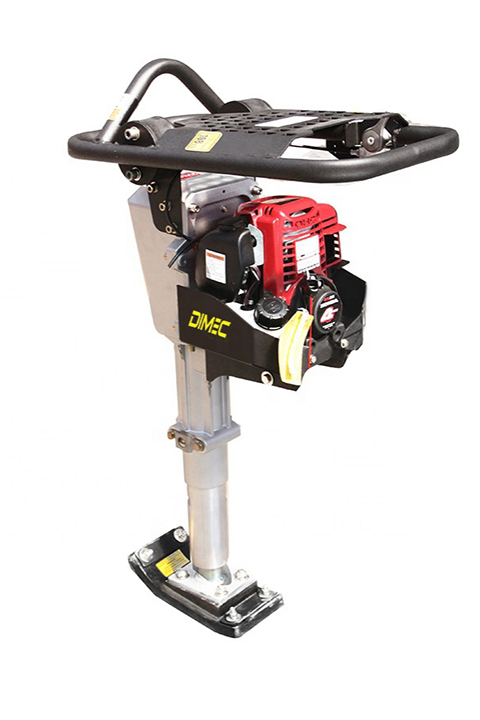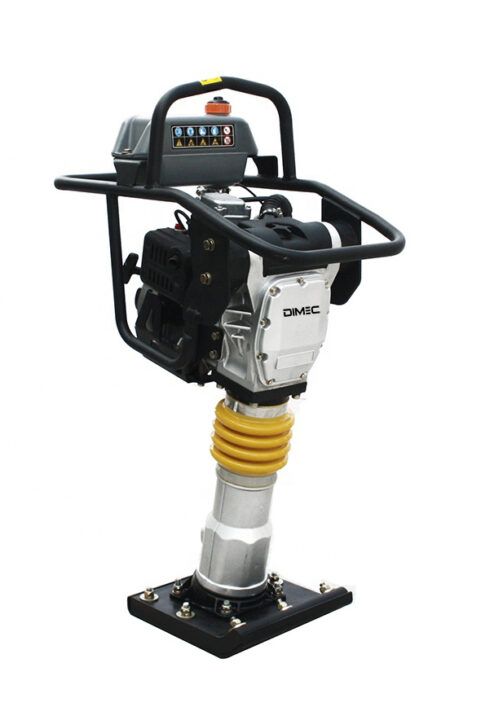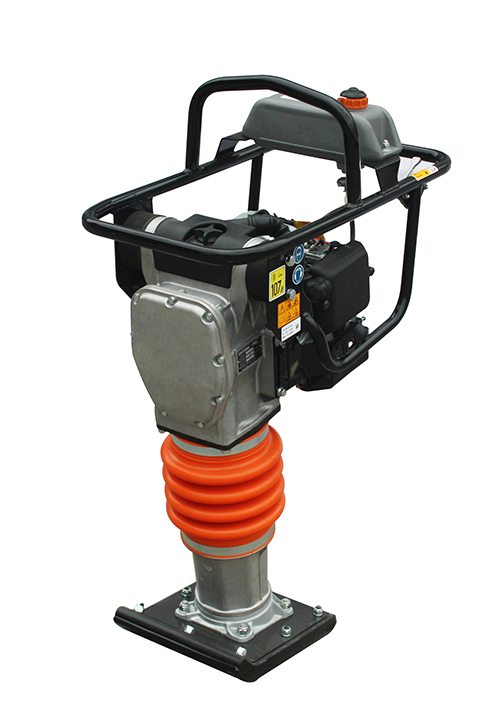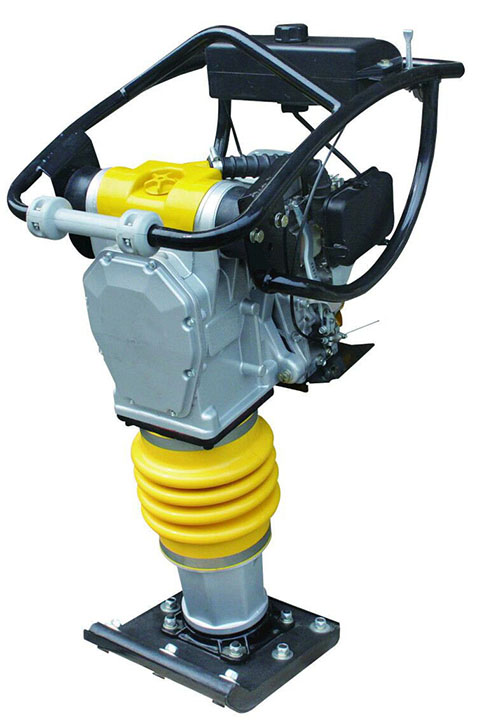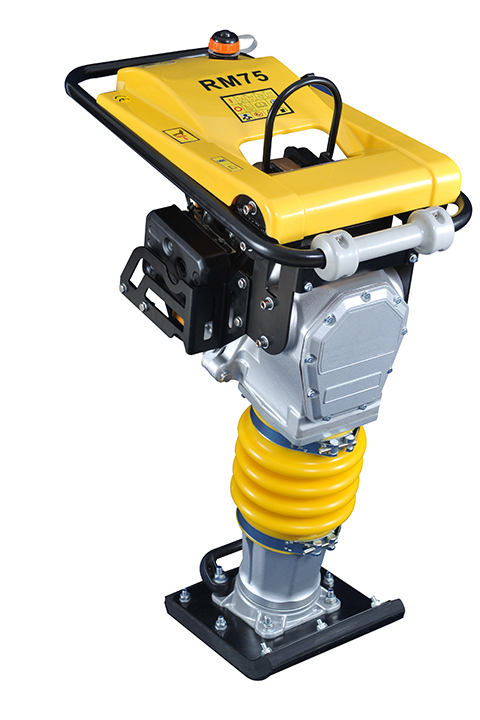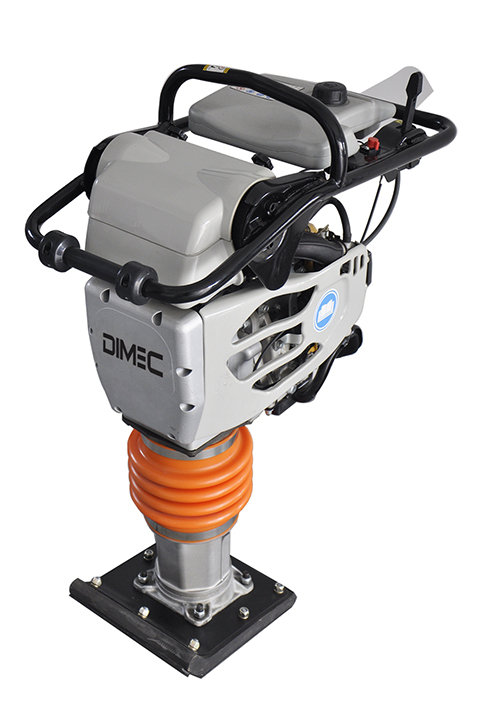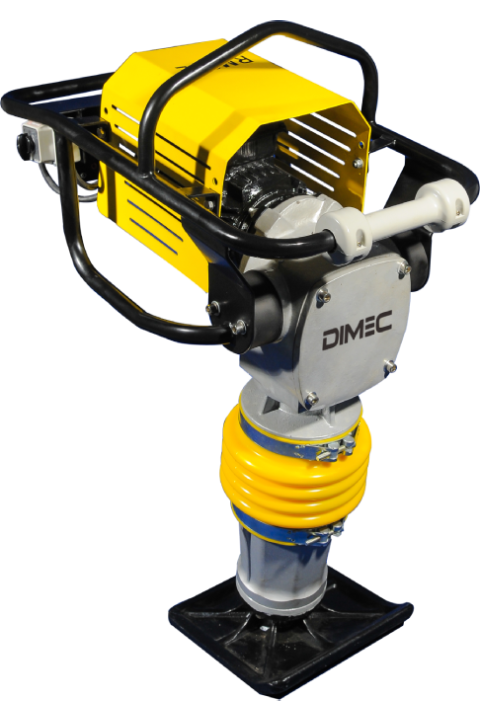Apisonador
Cuando busque un apisonador, podemos ayudarle a seleccionar el apisonador de tierra más adecuado para su empresa.
Descripción
El par generado por el motor o el motor eléctrico se transfiere al movimiento alternativo mediante el engranaje del cigüeñal, que lo transmitirá al pie vibratorio a través del cilindro de resorte. Tiene una gran fuerza de impacto aunque es pequeño y ligero.
El apisonador está diseñado específicamente para aplicaciones de apisonado duras en áreas confinadas, trabajos en zanjas, rellenos y trabajos de reparación en asfalto.
El apisonador es adecuado para compactar suelos cohesivos: la arcilla es cohesiva y sus partículas se adhieren entre sí. Por lo tanto, se necesita una máquina con una gran fuerza de impacto para apisonar el suelo y forzar la salida del aire, ordenando las partículas. Un apisonador es la mejor opción.
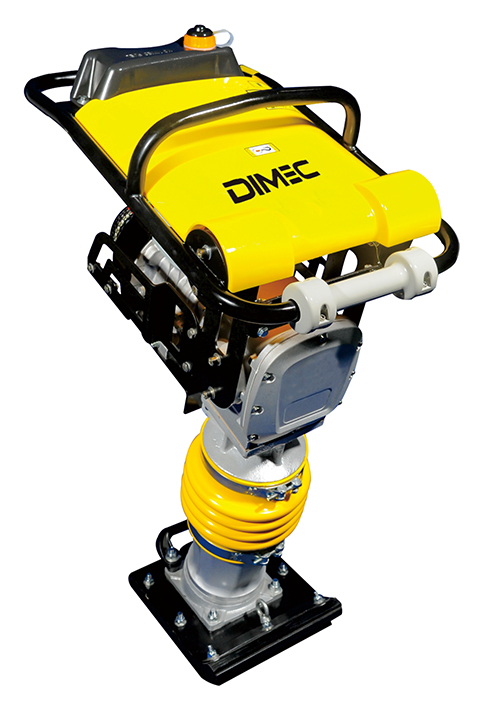
Característica
Autoequilibrio excepcional
Sobresaliente autoequilibrio de la máquina que proporciona una alta eficiencia a la vez que reduce la fatiga del operador.
Depósito de combustible de alta calidad
Depósito de combustible libre de polvo con filtro de combustible, mantiene limpia la gasolina que entra en el motor; El orificio de ventilación está abierto en la parte superior del tapón, para asegurar que el depósito de combustible sea transpirable, pero no penetre el aceite. El material plástico duradero y la junta resistente al aceite evitan las fugas de aceite.
Ruedas opcionales
Tres tipos de ruedas y su opcional. Fácil para el transporte.
Amortiguador eficaz
El sistema de amortiguación de impactos de alta resistencia reduce eficazmente los impactos en los brazos, por lo que mejora la comodidad de uso.
Parámetros del producto
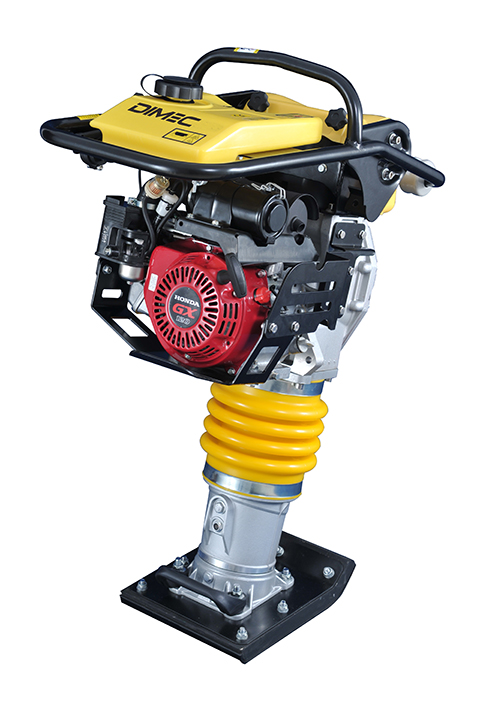
Apisonador eléctrico
- Propulsado por Honda GXR120
- Fuerza de impacto: 15KN
- Profundidad máxima de compactación: 60 cm
- Rendimiento: 300㎡/h
Los apisonadores eléctricos son herramientas esenciales para compactar tierra, grava y otros materiales sueltos en obras de construcción. Estas potentes máquinas utilizan un motor eléctrico para impulsar un pesado pie rectangular o redondo hacia arriba y hacia abajo rápidamente, ejerciendo una inmensa fuerza de compactación sobre la superficie.
A diferencia de los apisonadores de gasolina que producen emisiones, los apisonadores eléctricos son respetuosos con el medio ambiente y pueden utilizarse en interiores o en espacios reducidos. Ofrecen un funcionamiento silencioso y bajos niveles de vibración mano-brazo para mejorar la comodidad del operador.
Parámetros técnicos
| Modelo | PME-RM32 | PME-RM55 | PME-RM65 | PME-RM70 |
| Motor | Honda GX35 | Honda GX100; Robin EH09 | Honda GX100; Robin EH09 | Honda GXR120; Robin EH12-2D; Loncin LC165F-3H |
| Tipo de motor | Motor de gasolina de 4 tiempos, monocilíndrico, refrigerado por aire | |||
| Depósito de combustible [L] | 0.7 | 2.8 | 2.8 | 2.8 |
| Altura de salto [mm] | 50 | 70 | 85 | 85 |
| Frecuencia [VPM] | 790 | 695 | 680 | 690 |
| Fuerza de apisonamiento [KN] | 9 | 13 | 13 | 13 |
| Tamaño de la placa [mm] | 270×135 | 265×340 | 345×285 | 345×285 |
| N.W./G.W. [kg] | 32/35 | 58/68 | 68/78 | 75/85 |
| Paquete (L x A x A) [cm] | 93x33x60 | 68x35x103 | 72x38x108 | 75x43x110 |
| Modelo | PME-RM75 | PME-RM80 | PME-RM85 | PME-RM90 | PME-RM82E |
| Motor | Honda GXR120 /Robin EH12-2D / Loncin LC168F-2H/Motor diesel | Motor eléctrico | |||
| Tipo de motor | Motor de gasolina/diésel,monocilíndrico,4 tiempos,refrigerado por aire | Eléctrico | |||
| Depósito de combustible [L] | 2.8 | 2.8 | 3 | 3 | / |
| Altura de salto [mm] | 85 | 65 | 80 | 80 | 60 |
| Frecuencia [VPM] | 680 | 650 | 680 | 680 | 660 |
| Fuerza de apisonamiento [KN] | 14 | 10 | 15 | 15 | 10 |
| Tamaño de la placa [mm] | 345×285 | 345×285 | 345×285 | 345×285 | 310×280 |
| N.W./G.W. [kg] | 75/85 | 80/90 | 83/96 | 80/90 | 86/96 |
| Paquete (L x A x A) [cm] | 75x43x115 | 75x43x115 | 79x44x115 | 81x45x115 | 79x44x115 |
Aplicación
Ventajas del apisonador
Construcción robusta
Construidas con materiales resistentes para ofrecer durabilidad y un rendimiento duradero en entornos de construcción exigentes.
Potente fuerza de compactación
Proporciona una gran fuerza de compactación para compactar eficazmente tierra, grava y otros materiales, garantizando una base estable y sólida.
Diseño ergonómico
Diseñada pensando en la comodidad del usuario, con empuñaduras que reducen las vibraciones y fácil maniobrabilidad para un funcionamiento eficiente.
Bajo mantenimiento
Requiere un mantenimiento mínimo, lo que garantiza un rendimiento fiable y reduce el tiempo de inactividad.
Componentes de un apisonador
Motor
El corazón de un apisonador es su motor, que puede ser de gasolina, diésel o eléctrico. Este proporciona la fuerza necesaria para impulsar el apisonador.
Placa de pie
El reposapiés es la superficie plana que hace contacto con el suelo. Su tamaño y material pueden afectar al rendimiento y la idoneidad para diferentes tareas.
Mango
Las empuñaduras están diseñadas para un control ergonómico, lo que permite al operario guiar el apisonador de forma eficaz y segura.
Muelles y amortiguadores
Estos componentes ayudan a absorber el impacto y a reducir las vibraciones, facilitando el manejo del apisonador y prolongando su vida útil.
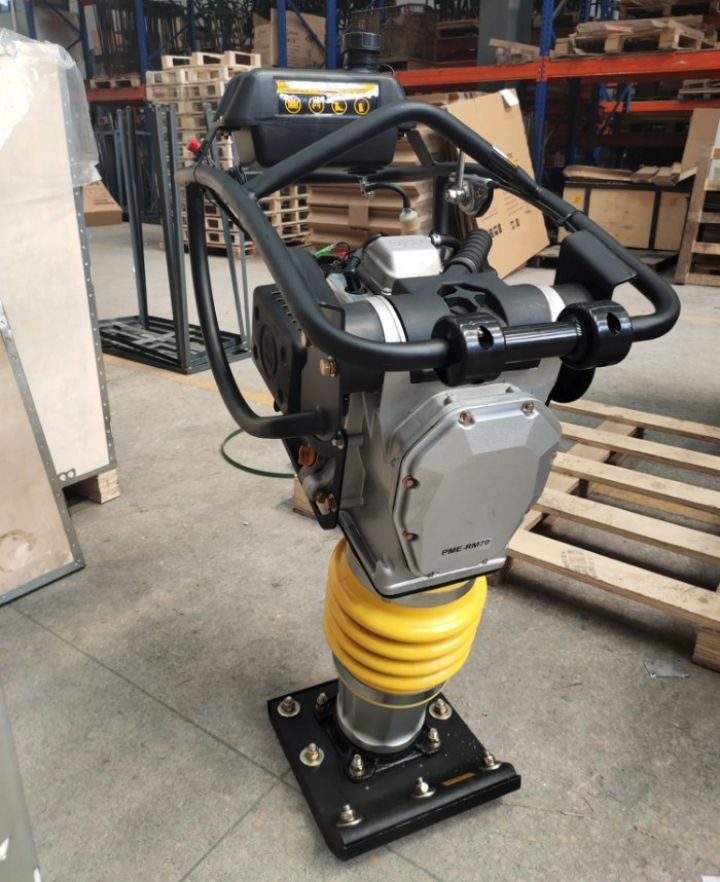
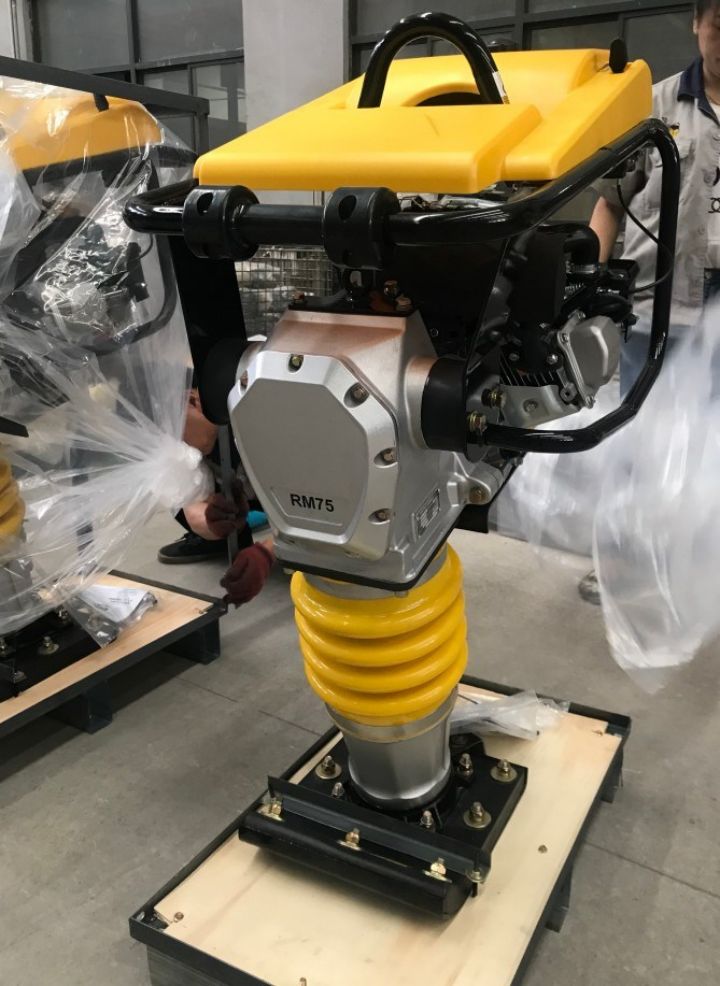
Tipos de apisonadores
Gasolina
Son los tipos más comunes, conocidos por su potencia y fiabilidad. Son adecuados para una amplia gama de tareas y su mantenimiento es relativamente sencillo.
Motor diesel
Los apisonadores diésel suelen consumir menos combustible y ofrecen un mayor par motor, lo que los hace ideales para aplicaciones pesadas.
Accionamiento eléctrico
Los apisonadores eléctricos están ganando popularidad gracias a su respeto por el medio ambiente y su menor ruido de funcionamiento. Son perfectos para proyectos de interior o zonas con estrictas normativas sobre emisiones.
Eficacia
Los apisonadores proporcionan una compactación rápida y eficaz, ahorrando tiempo y trabajo en comparación con los métodos manuales.
Portabilidad
La mayoría de los apisonadores están diseñados para ser portátiles y fáciles de transportar, lo que los hace prácticos para diversas obras.
Versatilidad
Pueden utilizarse en una amplia gama de aplicaciones, desde pequeños proyectos de paisajismo hasta construcciones a gran escala.
Características del apisonador PME
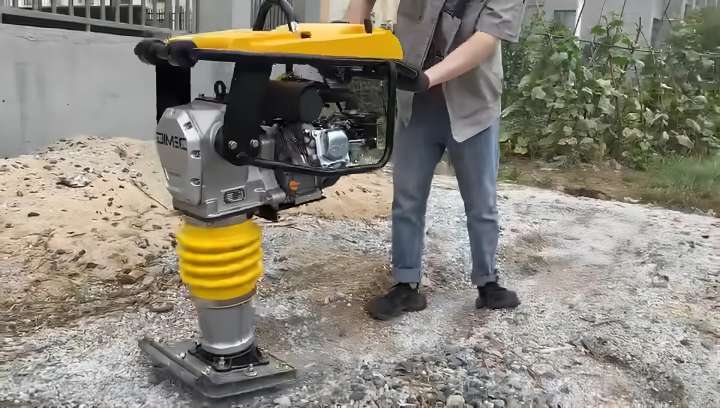
Elegir el apisonador adecuado
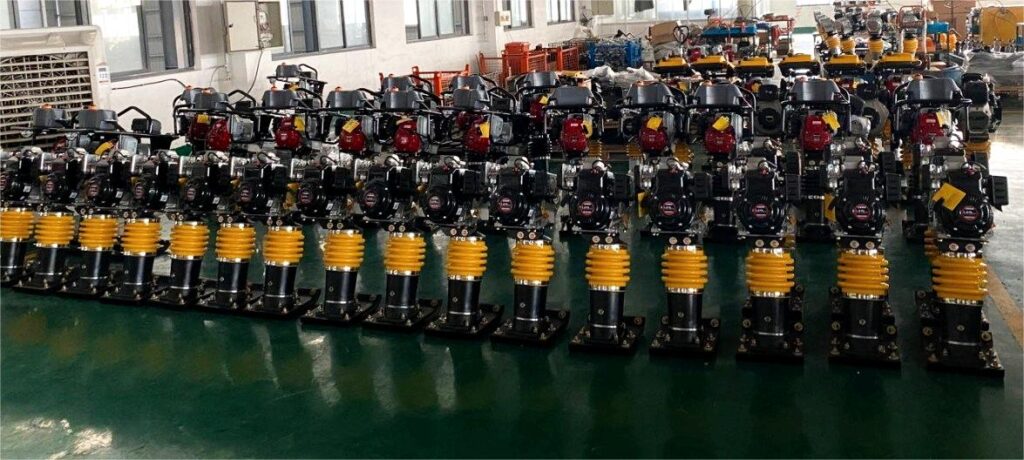
Requisitos del puesto
Tenga en cuenta el alcance de su proyecto. Para trabajos a gran escala, puede ser necesario un apisonador más potente, mientras que los proyectos más pequeños pueden requerir únicamente un modelo compacto.
Tipo de suelo
Los distintos apisonadores funcionan mejor en distintos tipos de suelo. Asegúrese de elegir uno que se adapte a las condiciones del suelo de su obra.
Consideraciones presupuestarias
Compare su presupuesto con las características y la durabilidad que necesita. A veces, invertir en un apisonador de mayor calidad puede ahorrar dinero a largo plazo al reducir los costes de mantenimiento y los tiempos de inactividad.
Un apisonador se utiliza para compactar tierra, grava y asfalto con el fin de crear una base sólida y estable para los proyectos de construcción.
El mantenimiento regular es crucial. Realice inspecciones y tareas de mantenimiento después de cada uso y lleve a cabo comprobaciones exhaustivas al menos una vez al mes.
No se recomienda debido a las emisiones. Para uso en interiores, considere un apisonador eléctrico para evitar humos nocivos.
Utilice guantes, protección auditiva, botas de seguridad y gafas protectoras para minimizar el riesgo de lesiones.
Sí, existen apisonadores eléctricos y modelos con motores eficientes de bajas emisiones que son mejores para el medio ambiente.
Mantenimiento
Programa de mantenimiento periódico del motor
| Cada uso | Primer mes o 20 horas | Cada 3 meses o 50 horas | Cada 6 meses o 100 horas | Cada año o 300 horas | ||
|---|---|---|---|---|---|---|
| Aceite de motor | Comprobar nivel | √ | ||||
| Cambia | √ | √ | ||||
| Filtro de aire | Consulte | √ | ||||
| Limpiar | √(1) | |||||
| Sustituir | √☆ | |||||
| Copa de sedimentos | √ | |||||
| Bujía de encendido | Comprobar-Limpiar | √ | ||||
| Sustituir | √ | |||||
| Parachispas (piezas opcionales) | Limpiar | √ | ||||
| Velocidad de ralentí | Comprobar-Ajustar | √(2) | ||||
| Juego de válvulas | Comprobar-Ajustar | √(2) | ||||
| Depósito de combustible y filtro | Limpiar | √(2) | ||||
| Cámara de combustión | Limpiar | Cada 300 horas (2) | ||||
| Línea de combustible | Consulte | Cada 2 años (Sustituir si es necesario) (2) | ||||
☆ Sustituya sólo el tipo de elemento de papel.
(1)Mantenimiento más frecuente cuando se utiliza en zonas polvorientas.
(2)Estos elementos deben ser reparados por su distribuidor a menos que usted disponga de las herramientas adecuadas y tenga conocimientos mecánicos. Consulte los procedimientos de mantenimiento en el manual.
Se realiza cada mes indicado o cada intervalo de horas de funcionamiento, lo que ocurra primero.
Programa de mantenimiento periódico del apisonador
| Diariamente antes de empezar | Después de las primeras 5 Hrs. | Después de las primeras 50 Hrs. | Cada Semana o 25 Hrs. | Cada mes o 100 Hrs. | Cada 3 meses o 300 Hrs. | |
|---|---|---|---|---|---|---|
| Comprobar el nivel de combustible | √ | |||||
| Comprobar el nivel de aceite de la máquina | √ | |||||
| Compruebe si hay grietas o fugas en la tubería de combustible y los accesorios. | √ | |||||
| Apriete los herrajes de la zapata | √ | √ | ||||
| Comprobar y apretar los tornillos de los cilindros del motor | √ | √ | ||||
| Comprobar y apretar la tornillería exterior | √ | √ | ||||
| Limpiar las aletas de refrigeración del motor | √ | |||||
| Arrancador de retroceso limpio | √ | |||||
| Cambiar el aceite del sistema de hincado | √ | √ | ||||
| Limpiar el silenciador del motor y la lumbrera de escape | √ |
Nota: Si el rendimiento del motor es pobre, por favor revise, limpie y reemplace los elementos del filtro de aire según sea necesario.
